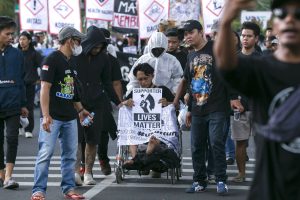Thousands of soccer fans have held protests in Indonesia’s East Java province, demanding a more thorough investigation of the crowd crush at a stadium that claimed the lives of 135 people last month.
Supporters of the local soccer team Arema FC started the rally with a prayer in Malang city in East Java before marching down the city’s main thoroughfare. Reuters reported that some protesters carried coffins and signs that read “All this because of tear gas.”
The crowd crush occurred after police fired tear gas in order to disperse Arema FC fans who swarmed the pitch at Kanjuruhan stadium in anger after their team was defeated by its arch-rival Persebaya Surabaya.
In the immediate aftermath of the Malang stampede, the worst stadium disaster since 1964, Indonesia’s President Joko “Jokowi” Widodo ordered the suspension of Indonesia’s premier soccer league. Later, he vowed to improve stadium safety and “thoroughly transform” the way soccer is administered in the country.
The government has not sat on its hands. In the aftermath of the crush, the Indonesian National Police removed the police chiefs of East Java province and Malang district and suspended nine other officers. Authorities have also announced criminal charges against six people for negligence, including the head of the league’s administration, PT Liga Indonesia Baru, two Arema FC officials, and three police officers who allowed or ordered officers to use tear gas.
But the protesters who attended yesterday’s rally in Malang, which also included people from other regions of Java, said that the government had to do more to hold those responsible accountable.
“Do arrest and judge all actors behind and the executors on the field from the Kanjuruhan tragedy on October 1,” the Arema FC fans said in a written statement, The Associated Press reported. “Make the Kanjuruhan tragedy a serious human rights violation and not just a minor human rights violation.” It also called for the government to offer compensation for “all losses suffered by the victim and the victim’s family.”
A government fact-finding team concluded last week that the “excessive” and “indiscriminate” use of tear gas by the police had prompted a frenzied rush for the stadium exits. It also concluded that the national soccer association PSSI had been negligent and ignored regulations, and urged its chairman and executive committee to resign.
At least part of the anger could be explained by the simmering discontent with the National Police, in particular the fact that police officers are very rarely held to account for the excessive use of force. In an article for The Diplomat last month, Aisyah Llewellyn quoted Usman Hamid, the head of the human rights group Amnesty Indonesia, as saying that the stadium crush reflected a broader discontent with the police.
“Police are rarely charged and tried for excessive use of force while police leadership often says that they will evaluate such incidents,” he said. “The Indonesian police unfortunately have a long track record of excessive use of force, including the misuse of ‘less-lethal weapons’ such as tear gas and water cannons, particularly in the last few years.”
Given this track record, it is unsurprising that members of the Indonesian public, particularly those directly affected by the Malang tragedy, are so reluctant to give the police, and the government as a whole, the benefit of the doubt.

































